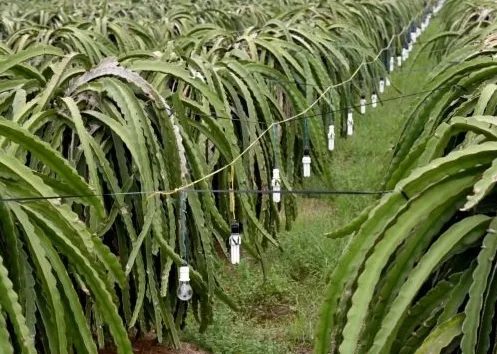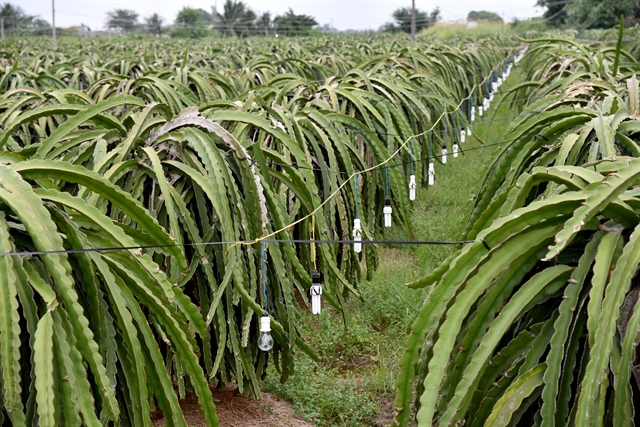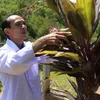Agricultural restructuring raises farmers' incomes in Bình Thuận
by ,http://vietnamnews.vn/society/535089/agricultural-restructuring-raises-farmers-incomes-in-binh-thuan07 September 2019 Last updated at 08:59 AM


BÌNH THUẬN – The restructuring of agricultural production in the south-central province of Bình Thuận has achieved positive results as more rice farmers have switched to high-value crops in drought-prone areas, earning higher incomes.
More than 3,000ha of ineffective rice fields were used for other crops last year, saving irrigation water in drought-prone areas, according to the province’s Department of Agriculture and Rural Development.
Tuy Phong, one of the province’s districts that restructured agricultural production, has unfertile soil and the lowest rainfall in the country.
Under the province's agricultural plan targeting sustainability, which was launched six years ago, district farmers began to grow other high value plants including dragon fruit, grape, mango and coconut.
In the district’s Bình Thạnh and Phong Phú communes, farmers have planted high value fruits such as mango and king orange on a total area of 80ha.
In the district’s Vĩnh Hảo and Vĩnh Tân communes, farmers have planted 300ha of Java olive trees and earned high income from harvesting the sap.
The district has also developed its salt making areas to 540ha. Farmers have produced clean salt by using plastic sheets to cover the beds of salt fields.
Farmers have also been encouraged to breed cows and goats.
Huỳnh Văn Điển, chairman of the Tuy Phong People’s Committee, said the district has restructured agriculture towards value addition. “The district has focused on switching to drought-prone areas,” he said.
The district’s farm economy now produces quality products that meet market demand, according to the district’s Agriculture and Rural Development Bureau.
Most farms in the district have an average income of VNĐ500 million – VNĐ1 billion (US$21,500 – 43,000) a year.
The province, which has mountainous, coastal and flat plain areas, has more than 670,000ha of agricultural land.
However, the competitiveness of the province’s agricultural products is still low as high-tech production last year accounted for about 5 per cent of its agricultural produce value.
Mai Kiều, director of the province’s Department of Agriculture and Rural Development, said the province would restructure production in combination with the use of high technologies.
The province is building a 2,000ha high-tech agriculture zone in Bắc Bình District which will grow high-value dry crops such as vegetables, garlic, onion, medicinal plants, food plants, fruits and other plants.
The department has provided farmers with advanced farming techniques and good agricultural practices (GAP) standards and encouraged them to apply VietGAP and GlobalGAP standards.
The province, the country’s largest dragon fruit producer, has more than 10,000ha of its 30,000ha of dragon fruit planted to VietGAP standards.
It has also more than 264ha of dragon fruit planted to GlobalGAP, according to the department.
The province has 30 co-operatives that grow, buy and process dragon fruit, with most of them growing it to VietGAP standards.
The province targets growing 50 per cent of dragon fruit under VietGAP standards next year and 70 per cent by 2025.
Dragon fruit and shrimp fry are the province’s key agricultural products.
The province, the country’s largest shrimp fry producer, has more than 100 shrimp-fry producing establishments, mostly in Tuy Phong District.
It produced more than 13 billion of shrimp fry, mostly black tiger shrimp and white-legged shrimp, in the first half of the year, up 5.5 per cent against the same period last year. – VNS





